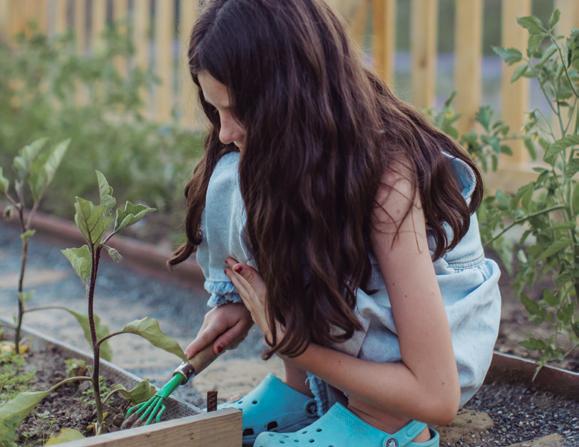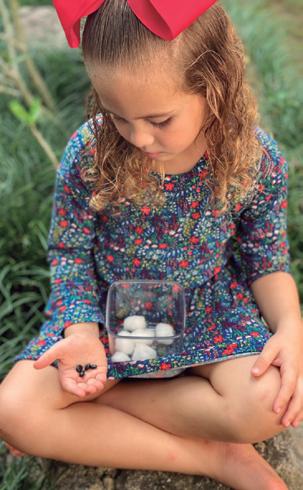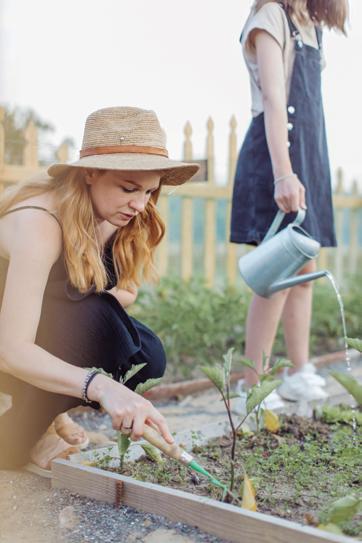
6 minute read
Los juegos son fundamentales para el aprendizaje de los niños, aprende sobre
CULTURA E HISTORIA
Huertos: su importancia en el desarrollo de los niños
Advertisement
Orchards: their importance in the development of children
Por: Roberto R. Hernández
Todos recordamos ese experimento en la clase de Ciencias, en donde plantábamos un frijol y, te maravillabas viendo cómo esa semilla se convertía en una pequeña planta. Tal vez, en este momento te parece algo muy simple, pero creo que de ahí probablemente te vino un lindo recuerdo a la mente.
By: Roberto R. Hernández
We all remember that experiment in science class where we planted a bean and marveled at how that seed turned into a little plant. Maybe, at this point, it seems like a very simple thing to do, but I think you probably got a nice memory from it.
Huerto / Orchard
Fotografía / Photography: anastasia-shuraeva - Pexels
Piensa bien, ¿a quién te recuerda? Tal vez algo gracioso, a tu mejor amiga de la escuela, a tu maestra linda o no tan linda, incluso alguien que ya no está contigo. Yo me acuerdo de cómo ponía esos frijoles en un algodón en un pequeño vaso de plástico en la ventana de mi abuela, con un olor a humedad. Ella era muy paciente y me dejaba tenerlos ahí, aunque les quitara la vista hacia sus lindas flores. Conforme avanza la ciencia, nos hemos dado cuenta de que lo más cercano a lo natural es mejor. En la pediatría, preferimos que los niños nazcan por parto natural antes que por una cesárea; la lactancia sobre las fórmulas; alimentos naturales sobre procesados; que los niños coman con sus manos en vez de darles papillas en la boca. Como si estuviéramos regresando a la era de las cavernas. ¿Qué sigue? ¿cosechar nuestra propia comida? En definitiva, pareciera algo que puedes hacer para comenzar a promover hábitos saludables, además de que es una excelente oportunidad para convivir con tus hijos y estimular su desarrollo.

Think about it, who does it remind you of? Maybe something funny, your best friend from school, your cute or not so cute teacher, even someone who is no longer with you. I remember how I used to put those beans on a cotton ball in a small plastic cup in my grandmother's window, with a musty smell. She was very patient and let me keep them there, even if it blocked the view out of her pretty flowers. As science advances, we have realized that the closest to the natural is better. In pediatrics, we prefer children to be born by natural birth rather than by a c-section; breastfeeding over formula; natural foods over processed ones; that children eat with their hands instead of giving them food in their mouths; as if we were returning to the cavern era. What's next, harvesting our own food? Defenetly, this seems like something you can do to start promoting healthy habits, and it is an excellent opportunity to have new experiences with your children and stimulate their development.

Experimento de germinación del frijol Bean germination experiment
Fotografía / Photography: Alejandra Evia
Vertiendo tierra / Pouring dirt
Fotografía / Photography: markus-spiske - Pexels
CULTURE & HISTORY
CULTURA E HISTORIA En una encuesta que realicé en mis redes sociales, un 80% de los padres que contestaron les gustaría tener un pequeño huerto y compartir esta experiencia con sus hijos. Sin embargo, por muchas razones como la falta de espacio, la migración constante de hogar y la edad de los hijos, han impedido que comiencen a hacerlo. Las personas que sí han logrado tener esta actividad con sus hijos, tienen un comentario positivo acerca de la experiencia vivida, aunque ésta pueda tener su grado de dificultad. Lo que me sorprendió de la encuesta, no fue que los niños lo disfrutaran, sino que gracias a esta actividad se creó una gran oportunidad de convivencia y de generar recuerdos también para los padres. De acuerdo con la Academia Americana de Pediatría, los juegos son fundamentales para el aprendizaje de los niños, ya que les da herramientas para su vida adulta como la resolución de problemas, colaboración y creatividad, que son cosas que se requieren para triunfar. Y en mi punto de vista, un huerto en casa podría ser un juego perfecto que proveerá a tus hijos de hermosos recuerdos y herramientas para la vida. I did a survey on my social media, and 80% of the parents who answered would like to have a small orchard and share this experience with their children. However, for many reasons such as lack of space, constant migration, and the children's age, have prevented them from building an orchard. Of those who have managed to have this experience with their children, most of them have a positive comment about it, even though it may have its degree of difficulty. What surprised me about the survey was not that the children enjoyed it, but that this experience created a great opportunity for having family time and to create memories for the parents as well. According to the American Academy of Pediatrics, playing is fundamental to children's learning because it gives them tools for adult life such as problem-solving, collaboration, and creativity, which are things that are required to succeed in life. And from my point of view, an orchard at home could be a perfect game that will provide your children with beautiful memories and tools for life.


Jugando en la ciénega Playing in the swamp
Fotografía / Photography: Alejandra Evia Jugando con hojas Playing with leaves
Fotografía / Photography: tatiana-syrikova, Pexels
Huerto / Orchard

Fotografía / Photography: anastasia-shuraeva - Pexels
Tal vez para ti no es el momento adecuado para comenzar a tener un huerto, sin embargo, puedes exponer a tus hijos a la naturaleza para que exploren el mundo con sus sentidos. Empieza permitiendo que se expongan a esos hermosos colores primaverales y a las hojas en el piso en otoño. Déjalos que sientan la textura de una planta o que casi se las lleven a la boca. Eventualmente irán aprendiendo que unas plantas crecen solas, y otras requieren de más cuidado.
Perhaps this is not the right time for you to build an orchard. However, you can expose your children to nature to explore the world with their senses. Start by allowing them to be exposed to those beautiful spring colors and the leaves on the ground in fall. Let them feel the texture of a plant or nearly put them in their mouths. Eventually, they will learn that some plants grow on their own, and others require more care.
CULTURE & HISTORY








